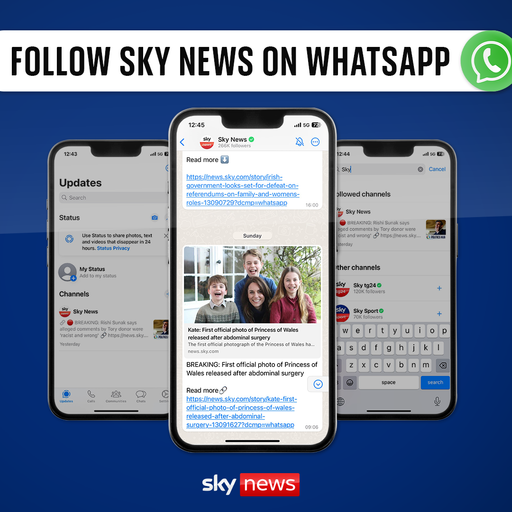The pictures from Beirut are unnerving to stay the least, the predictions for the immediate future even more so.
With the dust still settling from this game-changing assassination of Hassan Nasrallah, there are pressing questions crying out for answers.
Most of all, is the Middle East about to erupt into a regional conflict that threatens us all? That’s been the warning for almost a year, so is it about to happen?
Not if America and its allies can help it.
Follow latest: Iran warns Israel will ‘regret their actions’
Hezbollah is a designated terrorist organisation for the US, UK and other Western nations. It has killed hundreds of their citizens over the years. There is no doubt what President Joe Biden called a “measure of justice” that its leader has been killed.
But there is also a fear of what comes next. From the president down we are hearing urgent calls for de-escalation and a diplomatic solution. And the US has rushed military assets to ward off Hezbollah’s patrons in Iran doing their worst. But will that be enough?
More on Hezbollah
Related Topics:
Image: Lebanese Red Cross workers inspect a destroyed building. Pic: AP
US-led diplomacy to contain the Middle East crisis has failed.
A senior Middle Eastern diplomat told Sky News the assassination is a kick in the teeth for the US president.
Advertisement
“For all the bombs and billions he has given the Israelis,” he said, “the least they could have done for him in the last weeks of his presidency was a ceasefire in the region”.
With diplomacy stalled, what happens next depends on both Iran and Israel.
For its part, Iran may feel it has no alternative but to weigh in. It may fear the massive missile arsenal it supplied is so jeopardised it must intervene and save Hezbollah.
Iranians have long regarded Hezbollah as an insurance policy for the day Israel might attack Iran itself. If it sees its ally close to total collapse might it then weigh in?
If it does, Israel’s allies led by America might feel compelled to come to its defence. The full scale war feared for almost a year could engulf the region.
Image: Smoke rises in Beirut’s southern suburbs. Pic: Reuters
But there are good reasons for Iran not to rush to action.
The Middle East seems a dangerous and unpredictable place but certain rules and assumptions apply, even in all its chaos.
For all their fanaticism, the ayatollahs of Tehran are pragmatic and seek the preservation of their grip on power above all. That has been a rule of the Middle Eastern jungle since they seized power 45 years ago.
Is it pragmatic or wise to up the ante and more directly support Hezbollah, when it is at its weakest? The Iranian regime is not that strong either, crippled economically by sanctions and mismanagement and socially and politically by months of civil unrest, albeit now quashed.
Follow Sky News on WhatsApp
Keep up with all the latest news from the UK and around the world by following Sky News
Tap here
There are limits too to what Iran could achieve with direct military intervention anyway in a war that is 2,000km from its borders. The Iranians may conclude this round in the war against Israel is over. They think in long time spans, after all. Time to regroup and move on to fight another day?
There will no doubt be days more sound and fury, like we have seldom seen before. The mourning and funerals of Nasrallah and his lieutenants are likely to be the focus of intense anger and will raise tensions. But what happens afterwards?
That also comes down to Israel.
Image: People stand next to IDF tanks in northern Israel. Pic: Reuters
It may now feel it has the wind in its sails and seize the moment to invade on the ground in Lebanon to push Hezbollah back from the border. That would be an extremely dangerous moment too, potentially drawing in supportive militia and Iranian forces based in Syria.
The hills of southern Lebanon are a treacherous country for a military like Israel’s that relies on infantry and tanks. They could be drawn into a lengthy and punishing campaign that could then destabilise the region.
Please use Chrome browser for a more accessible video player
1:23
What does Nasrallah’s death mean for Hezbollah?
Read more:Analysis: Hezbollah and Iran must decide to fight or back downWho was Hassan Nasrallah?
Then there is Lebanon itself. An uneasy compromise between the warring factions of its civil war in the 1970s and 80s has held for decades but its always fragile status quo is now threatened. The chessboard of its multi-denominational politics has potentially been upended by the removal of its most powerful player.
If Lebanon descends back into factional fighting, regional stability will be undermined too.
The Middle East is in grave danger of further escalation. Western and regional diplomats are working round the clock to pull it back from the brink but recent efforts have all ended in failure and neither Israel nor Hezbollah seem to be listening.
Source : Sky News













